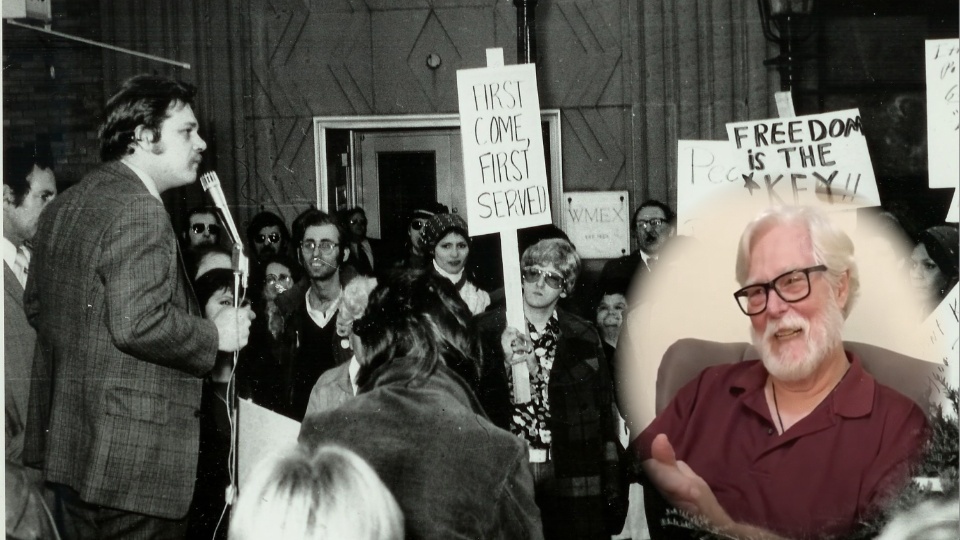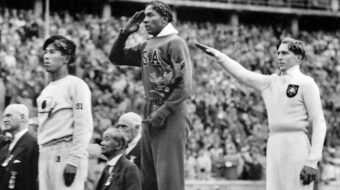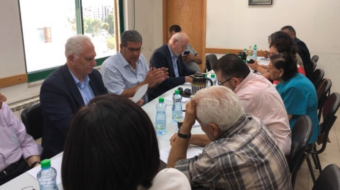
Fighter against racism and Jim Crow segregation in 1960s Oklahoma. Vietnam vet turned peace activist. Advance man for Robert F. Kennedy’s presidential campaign who was standing next to the candidate the night he was assassinated. Gay rights pioneer who pushed the Communist Party USA to turn away from its homophobic past. Advocate of socialism on two different continents.
Those are just a few of the many lives of Gary Wayne Dotterman, who died on May 10, 2023, in Ipatinga, Brazil.
Gary Dotterman was born in Tulsa, Okla., on June 11, 1944, the first child of Joe Dotterman, a union barber who counted among his clients the notorious gangster Pretty Boy Floyd, and Pansy Dotterman, an accomplished seamstress. His sister, Mary Jo, was born four years later. The family lived in a wooden tenement building in a multiracial poor neighborhood on the edge of the business district in Tulsa, the oil capital of the world at the time.
The Tulsa of Gary’s youth was a city rigidly divided by race and wealth, barely 20 years on from the Greenwood Massacre. It was a place, as Dotterman frequently said, where 1,600 families made over $1 million a year while 16,000 other families lacked indoor plumbing. As he remembered it:
“You knew the class you were in from the neighborhood you were born into. If you were on the east side, you were middle class, and if you were south of downtown, you were rich. If you were too far out, you were a dirt farmer. If you were north of Archer, you were Black. And if you were west of Main Street, you were white trash. I was west of Main.”

The Dottermans firmly believed education was the only way their children might escape poverty, so they enrolled Gary and Mary Jo in some of Tulsa’s best schools. At the age of 12, Gary’s lifelong interest in political action was sparked. Volunteering on campaigns in exchange for free Coca-Colas, he learned the ins-and-outs of door-to-door campaigning. In 1959, he volunteered on the AFL-CIO’s campaign to keep Oklahoma from becoming an anti-union “right-to-work” state. The fight was a victorious one; Oklahoma wouldn’t go right-to-work until 2001.
A short time later, he was hired by a local white attorney, Charlie Pope, who was running for city council. Dotterman was sent to drop literature, hang posters, and do some front-porch politicking in a place where no one else who worked for the campaign would go—Tulsa’s Black community. For weeks, Gary lived with the family of Ed Goodwin, owner of the Oklahoma Eagle, the oldest Black newspaper in the state. Gary was the only white person living in the community; he called the experience “the best education for a poor white boy that I had ever had.”
By 16, Dotterman said he began to “fantasize about someday becoming governor.” The experience of growing up poor himself, seeing the conditions forced on Black Oklahomans, and working with the labor movement made him dive into Democratic Party politics and the growing Civil Rights Movement. “I was never happier than when I was handing things out, organizing, getting coffee, meeting everyone I could meet,” he recalled when looking back on those days.
His Civil Rights works landed Dotterman in jail; he was beaten by police when attending a demonstration and locked up “for trying to get Black folks registered to vote.” He joined the fight to integrate Tulsa restaurants and even made his way to D.C. for the 1963 “March on Washington for Jobs and Freedom,” where he heard Rev. Martin Luther King, Jr. speak.

“The union work and the Civil Rights movement changed me from a person that was doing this for myself to someone who incorporated the ideals of solidarity, civil rights, and ending racism as part of my being,” he wrote in a letter to family members in 2019. “From then on, I became an activist working to make a better world for all.”
The following year, upon graduating high school, Dotterman joined the U.S. Navy and volunteered for service in Vietnam, seeing the military as a way to pay for college. When he signed up, Dotterman said he believed the U.S. government’s narrative that the battle in Southeast Asia was a “fight for democracy,” but he said he soon started to understand it was a “fight for control and profits.”
The absurdities of imperialism and capitalism began to torture his mind in Vietnam, “from killing other humans to how we just pushed our garbage into the ocean.” In a chapter he contributed to the book Alternative Oklahoma, Dotterman described the psychological horrors of being sent to murder people on the other side of the world:
“Our mission was to patrol the coast of Vietnam and conduct search-and-destroy missions on rural villages…. I was assigned to a 50-caliber machine gun. Since we were told anyone might be the enemy, I was ordered to destroy local fishing boats and kill their crews. Our missions were intended to count the bodies of villagers and of other beings that had walked the earth and boost the body count for Secretary McNamara’s war. My last shore mission in 1965 was called ‘Dagger Thrust.’ I counted bodies and shot anything that wasn’t already dead.”
Washington demanded high body counts to give the image of impending victory, so adults, children, cats, dogs, chickens, cows, and monkeys were all counted as Viet Cong, he said. His ship was also part of a mission to “show the flag” off the coast of Indonesia—a means of demonstrating that U.S. military power supported General Suharto as his army murdered 200 striking workers and Communists in Jakarta.
Unable to accept what he saw and what he was being ordered to do, Dotterman began writing critical letters to family and friends—and to newspapers back home. In a letter published in the Tulsa Democrat, he pleaded: “The Viet Cong have no ships or highly-trained military troops, but they do have something that is causing us to lose this war…. They use facts against us, drawing a picture of U.S. troops as destroyers…. We are on the wrong side.”

If his critical missives about U.S. war policy hadn’t already marked Dotterman for discipline, his growing acceptance of his own sexuality certainly did the trick. While on shore leave in Tokyo, Gary “took full advantage of everything” the city had to offer and “made many friends in Japan”—the type of friendships that the U.S. Navy did not allow its sailors to enjoy. After superiors found about his Tokyo friendships, Dotterman was hauled away by heavily-armed Marines and locked in the brig.
For weeks, he was kept isolated “in a metal box,” and threatened with being shot. Dotterman was held in limbo for months, not knowing what his fate might be. Out of desperation, he wrote to President Lyndon Johnson requesting a court martial. Then, just as suddenly as he’d been arrested, Dotterman was thrown on a plane, shipped to San Francisco, and discharged from the Navy—no explanation given.
“I had volunteered to go to Vietnam, but I returned to the States feeling like a war criminal,” Dotterman said, “not because of my friendships in Tokyo, but because of my complicity with the heinous crimes we committed in Vietnam.”
Back on American soil, Gary threw himself into anti-war work, searching for a way to make amends for his actions in Asia. “A soldier was something for the military to use and then throw away…. I knew my brothers in ’Nam were killing and being killed for someone else’s profit, not for freedom.”

“The odor of burning human bodies…and the memories of women and children crying for help inside the homes that we had set fire to” were visions he had to force from his mind every night. Like many veterans experiencing what would later be known as PTSD, he sought refuge in the bottle, beginning an alcohol problem that would afflict him for years. His sexuality, too, gave Dotterman endless stress. Seeing the example of White House aide Walter Jenkins, who had to resign in disgrace after being arrested with another man in a YMCA restroom, showed him the high cost of being gay in politics.
He also reconnected with buddies in the Tulsa Democratic Party and was asked to organize an Oklahoma visit by President Johnson. After a small peace vigil at the LBJ rally ended with police beating demonstrators, Gary had seen enough. He and some other returned soldiers founded the Oklahoma chapter of Vietnam Veterans Against the War.
In 1968, he ran unsuccessfully for state representative in Oklahoma. Even in the conservative Sooner State, though, the VVAW managed to bring out hundreds to campaign for peace. Dotterman said, “This battle was the best of the worst, and we as vets must not forget that when we began to speak, the heartland of America began to listen.”

In the 1970s, Dotterman moved to D.C. and continued his political and labor activism—organizing with Cesar Chavez’s United Farm Workers and the International Ladies Garment Workers Union; working on the presidential campaigns of Robert F. Kennedy, George McGovern, and Edward Kennedy; and finally becoming comfortable enough in his own body to join the movement for gay liberation. For two years, he worked in New York for Jews for Urban Justice and also had a stint with the National Welfare Rights Organization.
In 1981, he went to Massachusetts to work on a Senate campaign. “I opened a couple of gay bars in Boston,” he said, “and stayed.” From 1981 to 1983, he published the magazine Gay Guide to New England. Like many in the gay community during this time, Gary also, unfortunately, lost a lover—Johnny Cyrus—to the AIDS crisis.
In 1983, Dotterman became a staffer for a Boston city councillor, but four years later, right-wing members of City Council banded together to fire him after his involvement in a campaign to raise money for a group fighting against anti-gay discrimination. He sued the council for unjustified termination but continued to work at his job every day even though he wasn’t being paid.
“The only support I got was from the ACLU, two unions, a Black member of City Council, and the Massachusetts Communist Party,” he would later say. It was then that “the best thing ever happened to me,” according to Dotterman. He attended a fundraising event for the Daily World newspaper (now known as People’s World), where Boston CP activist Laura Ross walked up to him and asked him for a dollar. He said, “What for?” Ross responded, “Your party membership initiation fee…. You’ve walked with us too long not to be one of us.”
Dotterman said that for 30 years he had feared being a member of the Communist Party might affect his political career. But after being fired, he said he knew the right wing would come after progressives whether they were actually Reds or not, so he decided it was time to “show the flag.” He joined the CPUSA that night.
Eventually, Dotterman prevailed in his lawsuit and got his job back. Around this time, he also met Geraldo Ribeiro Dias, the man who would become his husband and the love of his life for the next 28 years.

In 1993, Dotterman put himself forward as a candidate for an at-large City Council seat for the first time (he’d try again in 2002). He ran on a platform demanding living wages, day care for working parents, better school funding, police reform, and anti-discrimination ordinances focused on racism, sexism, homophobia, and anti-Semitism. He garnered over 5,000 votes.
Dotterman moved on to take up teaching at the University of Massachusetts and also devoted more of his time to organizing the Communist Party in the state. He became head of the Center for Marxist Education in Cambridge.
Elected to the National Committee of the CPUSA, Dotterman became one of the most outspoken figures in the party pushing it to renounce its long history of homophobia and discrimination against gay and lesbian members. Though the Communist Party had stopped expelling its queer members many years before, there had never been a full accounting of the past nor a reconciliation over its intentional aloofness from and outright criticism of the gay liberation movement.
At the CPUSA’s 27th National Convention in 2001, Dotterman submitted a resolution committing the organization to join the fight for LGBTQ liberation. “I remind my comrades,” he said from the convention floor, “that it is time that we march with our brothers, sisters, sons, and daughters in the GLBT movement as well as any movement.” To build support, he worked the delegates, talking up the resolution and handing out buttons with a pink triangle and a CPUSA emblem bearing the slogan, “An injury to one is an injury to all.” That convention is where I first had the chance to meet Gary; I still hold on to that button as a memento of the history made at that meeting.

The resolution passed, and soon after, the Communist Party joined the New York City Pride parade for the first time.
Upon his retirement in 2009, Gary and Geraldo made the decision to move to the latter’s native Brazil. However, the country did not yet recognize marriage equality. The couple decided to apply for permanent residence for Gary anyway, and surprisingly, were successful. Legally, theirs became the first same-sex marriage granted legitimacy by the Brazilian state—more than three years before marriage equality became law.
In his new country, Dotterman continued his socialist activism, becoming involved with the Partido Comunista do Brasil (PCdoB). He also continued his decades-long tradition of playing Santa Claus every December, though now in Rio de Janeiro rather than at a Sears in Tulsa. The money he earned from being Saint Nick went toward covering the cost of meals he cooked for homeless persons in his neighborhood every Sunday.
In 2019, Geraldo Dias, Gary’s “Dinho,” died. Dotterman was heartbroken but said he would join his departed love in a short time. In a Facebook post after Dias’ passing, Gary wrote, “Remember, I still have some work to do with my comrades first.”
Returning to the United States for the Communist Party USA’s 31st National Convention later that summer, Dotterman completed part of that work. Present at the gathering were fraternal delegates from Vietnam. Gary asked for the opportunity to meet with the foreign guests. In discussions held on the sidelines of the convention, he got the chance to finally exorcise some of the ghosts that had haunted him since his time in the Navy.
He apologized directly to the visitors from Vietnam, seeking forgiveness for the terror that he and other American soldiers had inflicted on their country so many decades before. He recognized that the youth of the U.S. had been fed propaganda and sent to die in a rich man’s war, but he sought absolution all the same. The guests from Vietnam listened intently. Then, they threw their arms around his neck, embracing him as a comrade in the fight for peace and international friendship.

Dotterman then returned to Brazil, where the COVID pandemic kept him for the next three years. In my correspondence with him, he regularly invited my partner and me to visit Brazil, with the guarantee of a free place to stay and a warm welcome from his adopted family there. I said we would certainly come for a visit, but I regret never taking him up on the offer in time. In April 2023, Gary was hospitalized for heart problems, which eventually progressed to multiple organ failure. On May 10, he died.
José Reinaldo Carvalho, a member of the PCdoB Central Committee, told People’s World: “Gary’s death is a great political loss for Brazilian and American Communists. I express my solidarity with his family and closest friends and my feelings of mourning—as a Communist, as a comrade, and as a leader of the party.”
CPUSA National Co-Chair Rossana Cambron from Los Angeles did not have the chance to work closely with Dotterman, but she recalled the generosity he once showed to her family, despite having never met them. “Gary provided housing for my son and a fellow student when they went to a symposium in Massachusetts and had nowhere to stay,” Cambron said. “It showed to me that he had a giving heart because he did not really know us other than as comrades.”

Though no longer a member of the Communist Party himself, former CPUSA National Chair Sam Webb remembered Gary as “irrepressible and fearless.” Discussing the role Dotterman played in the party in the 1990s and early 2000s, Webb said: “Gary, probably more than anybody else, helped us acknowledge a historical and painful wrong, expand our vision of freedom, love, and desire, and recognize the humanity and righteousness of the LBGTQ community.”
Dotterman not only joined the party despite its past homophobia, he also nudged it to change itself, “with a sense of compassion, forgiveness, and joy.” Webb said that Dotterman’s “footprint in the party’s annals is large indeed.”
Reflecting on his own life as a Communist and fighter for LGBTQ liberation in the pages of People’s World in 2002, Gary Dotterman wrote:
“There are many things that can divide the movements—homophobia, anti-communism, racism, and male supremacy, just to name a few. It is incumbent upon all the democratic forces to find points of unity, to work together, and build relations and trust in the face of our common enemies.
“To that extent, I hope more Communist Party contingents march in Pride parades. It is time to see our banner marching in every Pride parade. Many Communists are there and have been there from the start, but the world needs to see us more.”
This summer, as the fascist faction of the Republican Party leads a crusade against LGBTQ Americans—especially trans members of the community—Communists are there, marching in Pride parades in every major city in the country and plenty of small towns as well.

The Communist Party that Gary Dotterman fought for—a party where LGBTQ people are not only recognized as part of the democratic coalition needed to win socialism but are themselves leading activists—has come to pass.
Gary Dotterman — ¡Presente!












Comments